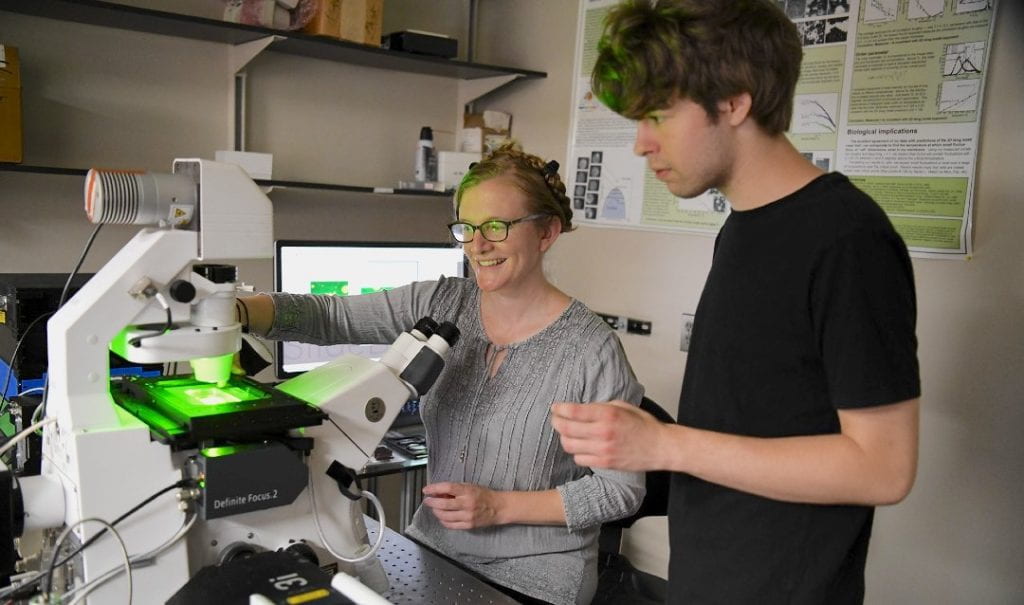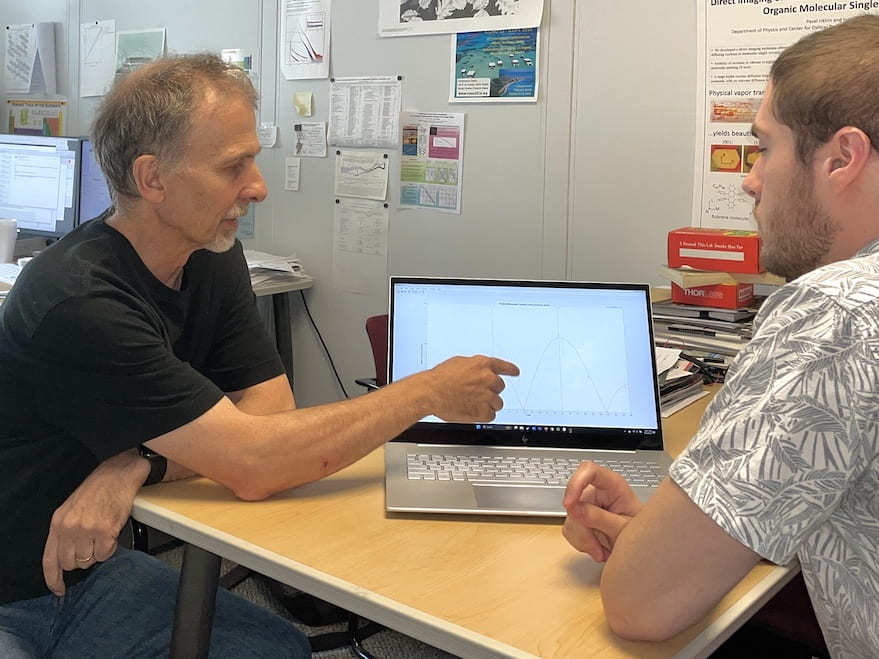This is the dedicated graduate program website of the Physics Department at Lehigh University, providing information to students interested in pursuing a MS or PhD degree in Physics at Lehigh University. Below is an introduction to the program. Follow the links in the menu above for even more information.
The Physics Department at Lehigh University

The Physics department at Lehigh University offers a program of coursework and research leading to M.S. and Ph.D. degrees in Physics, with research opportunities across a wide range of fields.
Approximately 50 students are enrolled in the PhD program at any given time, supported by research and teaching assistantships or fellowships, each student actively pursuing their research goals in over a dozen subfields of physics. The physics department offers research programs in several areas, including condensed matter physics, photonics, quantum electronics, quantum many-body physics and ultracold atoms, biophysics, high energy physics, nuclear physics, string theory, and cosmology

PhD students in the department are actively involved in the scientific community, present their research at scientific conferences, and publish their findings in peer-reviewed journals. Students have access to a range of computational and experimental facilities, including those related to condensed matter physics, atomic and optical physics, biophysics, particle accelerators, and lasers.
The department is dedicated to fostering students’ success, and it offers full support for incoming PhD students, including tuition waivers and competitive stipends. The department has a long history of placing its graduate students in successful careers after graduation. Graduates from the Lehigh physics program work as professors in academic research or teaching positions, in national laboratories, and in various industries.

Graduate students in Physics work closely with a diverse and internationally recognized faculty to carry out cutting-edge research that advances knowledge in a broad spectrum of fundamental and applied areas. While working towards the Master of Science and PhD degrees, students will not only make an impact in their chosen research field, but also develop problem-solving skills that can be applied much more broadly. Many of our doctoral students go on to teaching and research positions at universities and national labs, while others begin careers in industry or government.
Unique Features

Lehigh’s physics graduate program has several unique features that set it apart from others. Our relatively small institution, located in a small town with a low cost of living, is also conveniently close to major cities like New York and Philadelphia. This provides students with the opportunity to enjoy the best of both worlds: a peaceful campus environment with easy access to the countryside or all the resources of nearby urban centers.
One of our standout attributes is our low student-to-faculty ratio, which allows for close interactions and support from faculty members. Our research groups consist of a faculty advisor and a small number of students, promoting deep interactions and individualized attention during research activities. Our class sizes are also small, further enhancing the personalized experience of our program.
Our program’s commitment to diversity is another distinguishing characteristic. With over a quarter of our faculty being female, significantly higher than other physics departments in the nation, incoming students will find many role models and mentors with diverse perspectives and lived experiences as underrepresented scientists. These attributes make our program an excellent choice for students seeking a supportive, personalized, and diverse graduate experience in physics.
Degrees Offered by the Program
The normal terminal degree for those who want to pursue a career in scientific research or related areas in physics is the PhD. Students who have a bachelor’s degree can apply directly to the Lehigh PhD program and can receive a MS degree along the path to a PhD. All students admitted to the physics PhD program are supported financially (via a teaching assistantship, a research assistantship, or other fellowships), and the tuition for their coursework will also be covered.
Certain career pathways can benefit from a terminal MS degree. Interested students who are admitted to the MS degree program in physics can expect to earn their MS degree after three semesters and one summer, the minimum time required to accumulate the required 30 credit hours of course work. However, it must be noted that students admitted only to the MS program cannot enjoy financial support for their studies, and will be responsible for their tuition and living expenses.
The set of core courses taken by students in the PhD and MS programs include some at the advanced graduate level that provide the broad background in physics that is so important in the long run, and also specialized courses relevant to the research interests of the student.
Choosing an advisor

The Lehigh physics department conducts research in a wide variety of areas in physics. Students admitted to our PhD program are not expected to immediately work with a specific advisor or in specific subfields of physics. Rather, we admit all applicants generally to the full physics PhD program. After the first two semesters of classes, students are paired with temporary advisors to conduct research for a summer, and then select final advisors and subfields of study in their second year. Since the number of positions available in individual research groups can vary depending on funding and other factors, admitted students may sometimes need to be flexible when it comes to their final research topic, but it is guaranteed that everyone will become part of a research group.
Summary

- Research opportunities with internationally recognized physicists at the forefront of their fields
- Small faculty-to-student ratio and dedicated mentors
- Interdisciplinary research projects
- State-of-the-art instrumentation facilities
- Financial support: tuition, and health care benefits through teaching assistantships, research assistantships, and fellowships to all students enrolled in the PhD program.
Continue to other pages for additional information, application requirements, a typical timeline, or our geographic location and contact address.
Submit your application through the College of Arts & Sciences Graduate Programs website.
For other information about the department and research activities, visit the main website of the physics department.

